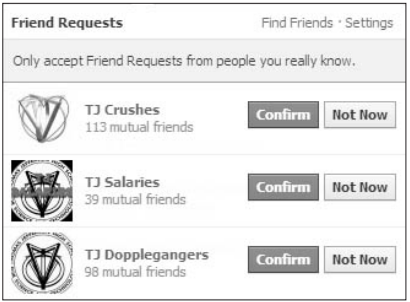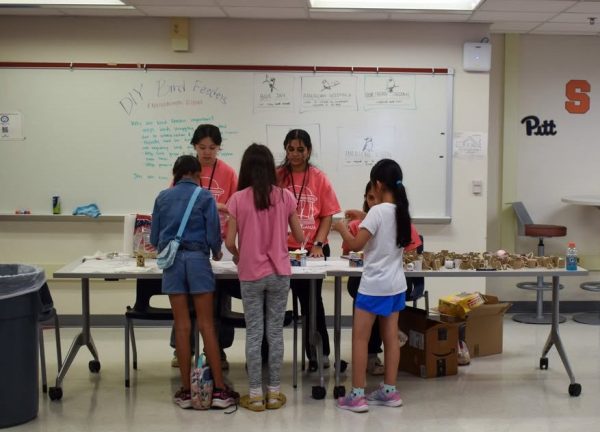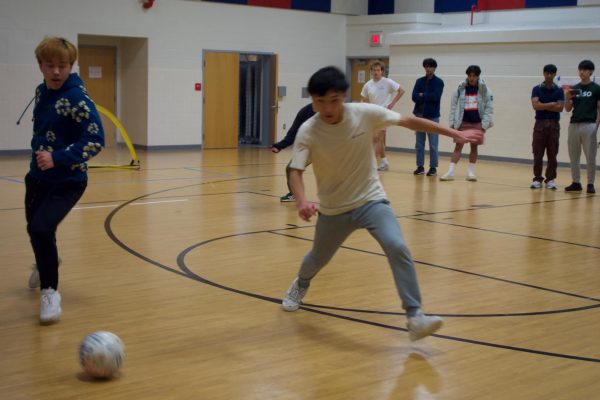Facebook fracas: Interactive pages turn invasive and ugly as students create forums for expression

Photo courtesy of Facebook
“What’s on your mind?”
The question tugs at Facebook’s one billion users when they visit the familiar blue color palette. But, at Jefferson, where this social networking site is akin to an obsession, the last few months have revealed a dark side to its popularity.
A recent viral trend began at Queen’s University in Ontario and reached the Facebook accounts of Jefferson students as compliments pages. Those positive sites quickly spiraled into evil twins of the original positive pages.
These pages based on anonymous submissions were created in a frenzy in March and included ones such as TJ Confession, TJ Confessionals, TJ Blatant Lies, TJ Crushes and even TJ Doppelgangers. These second generation pages stopped being as positive and became inflammatory and inappropriate.
“I hate pretentious little pricks with a passion…” one submitter to TJ Confessionals said.
Other posts went as far as to mention names of specific students. Most submissions received little to no likes or comments.
“When I first saw them, they did seem pretty funny since everyone loves to gossip and hear silly stories. But really I don’t think it was a good thing to do,” senior Garrett Shapiro said. “Whenever you have people posting stuff anonymously, they can say whatever they want with no consequences.”
In particular, TJ Confession and TJ Confessionals met resistance from school administrators because they were posting controversial messages and criticisms of the school and students while using the Jefferson logo as the pages’ profile pictures.
“The TJ community should know the use of TJ’s name and its logo is misrepresentation,” Principal Evan Glazer said. “It’s a violation of the SR&R because it’s presuming that when you use the TJ name or logo, it’s permissible by the school.”
Administrators contacted Facebook to request the removal of the pages for their inappropriate, offensive and harassing content.
“The valuable aspect actually was when some Facebook users went on to those existing sites and sent some positive messages to them to say that this isn’t really what the TJ culture is all about,” Glazer said. “Ultimately, I think a lot of people took down the sites themselves before Facebook authorized removal of them.”
Not all students thought the invectives were funny or appropriate.
“When did this thing become about bashing people? Seriously…what the f*** guys?” another submitter to TJ Confessionals said.
Soon, other members of the campus community because a target. TJ Salaries posted the salaries of Jefferson faculty and staff at the request of anonymous submission forms that included fields for the request as well as the question: “If you could fire one faculty member, who would it be?”
English teacher Emily Orser was the subject of one salary request.
“Since public school teacher salaries are public information if people know the number of years and education level of a teacher, I don’t mind that it has been posted,” she said. “It does make me rather curious why someone would want to know.”
Administrators did not ask this page to be removed because faculty and staff salaries are accurately represented on TJ Salaries. However, this page also contained commentary on those salaries, which ranged from “This person is priceless” to “What does this person do to earn this much?”
Once these new pages sprang up, TJ Compliments started posting less frequently.
“During all that hullabaloo, we decreased the amount we posted because we wanted to make sure it was OK for us to continue posting,” the TJ Compliments creators, who asked to remain anonymous for now, said. Their identities will be revealed in Techniques, the Jefferson yearbook, in early June.
“We do still receive submissions and have many left over from before we lessened our amount of activity, and we do plan on starting to post again.”
The negative pages temporarily obscured some of Facebook’s more positive functions for students.
“A lot of times assignments aren’t really made clear in class or on Blackboard, and the class groups are a great place to fill in missing information that someone else might have,” junior Jordan Goodson said.
Freshmen Jesse Cai, Fudong Fann, Chris Hoang and D.J. Jayachandran created the group “TJHSST Class of 2017” for incoming freshmen to meet each other as well as to talk to current students. As of May 15, the group had 937 members.
“Facebook is suitable for such a group because it’s more immersive than other social networks, and most people use it,” Fann said.
Despite its benefits, Facebook comes with downsides. Users may be bothered by ads on the sidebar, and while privacy settings can be toggled, invasion of privacy remains an issue.
“I dislike the amount of unnecessary features that Facebook encompasses as well as the possible security issues that might arise from use,” junior Tommy Lunn said.
Among other high schools in the Northern Virginia area, Jefferson appears to be somewhat of an anomaly because of the large presence of Facebook in students’ lives.
“I use Twitter more. It’s more current and there are more active people,” Annandale High School junior Melissa Pratt said. “There have been Twitter fights that have led to suspensions as well as Twitter fights causing real-life fights which have led to expulsions.”
Though Twitter has 500 million users, half the size of Facebook’s following, it is growing at an impressive rate. According to eMarketer, the number of Facebook users increased by only 6.6 percent in 2012 compared to Twitter’s 20.7 percent jump.
Robinson Secondary School senior Anagha Srikanth is in the IB program and has noticed that IB students use social media a lot more “because they tend to be more invested in their classes and schoolwork.” However, only the more difficult classes have Facebook groups.
“The thing with Facebook is that someone has to take the initiative to start a group, invite people and make the page useful, so it’s usually for the more organized,” she said. “Twitter isn’t really organized, but people use it more often to get help in classes if they just have a question or to make quick announcements that they want a lot of people to see.”
Junior Carrie Murton observed the same connection between students’ social media and academic habits.
“I mentioned a class Facebook group to one of my friends at another school, and he thought that was really strange and said that his school has nothing like that,” Murton said. “I’d say we probably do because TJ kids are so caught up in school and obsess over grades and homework to the point it factors into their entire social life, including social media.”
(This article originally appeared in the May 17, 2013 paper.)

![New weapons detectors were installed this morning through a pilot program required by Superintendent Dr. Michelle C. Reid after an incident at West Potomac High School. “These threats [have] only happened once, but you can never really know when [it will happen],” junior Laura Moreno Hernandez said. “I think this precaution, if we get used to it, will be [fine]. It’s better to be safe than sorry.”](https://www.tjtoday.org/wp-content/uploads/2025/06/IMG_9022-e1749223594242-600x364.jpeg)

![Students take taffy from the tables in Nobel Commons. “Get the word out and let everyone know,” principal Michael Mukai said. “We want to share this moment before we go away [for spring break].”](https://www.tjtoday.org/wp-content/uploads/2025/04/IMG_4372-600x450.jpg)

![Students and teachers at the town hall passionately spoke about issues that were brought up, such as the retake policy, the 70/30 split between summative and formative grades, and academic dishonesty. “Every single month, we go to something called the Superintendent Advisory Council meetings that address county-wide issues, for example, the 70/30 split with the summatives and formatives that’s going on right now as well as other [issues] you all have,” senior SGA secretary Jaydon Son said.](https://www.tjtoday.org/wp-content/uploads/2025/03/IMG_8917-600x400.jpg)